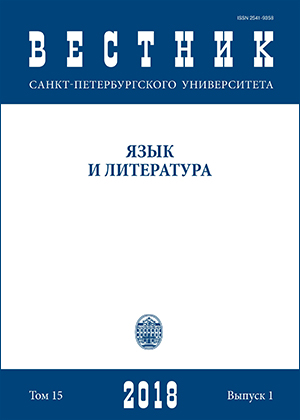The “pre-postmodernist complex” in Leonid Andreev’s prose and dramas against the background of the processes in the qorks by the symbolists of 1910s
DOI:
https://doi.org/10.21638/11701/spbu09.2018.106Abstract
The article characterizes the emergence of the “pre-postmodernist complex” in Leonid Andreev’s prose and dramas against the background of the processes in the works by the symbolists of the 1910s. F. Sologub created original cycles of miniatures such as Transformations, Short Fairy Tales. They appeared in the process of reducing all the artistic elements in the structure of the novellas, and a combination of completely opposite fragments or fragments of different nature was the basis of their grotesque integrity. This resulted in an ironic “descent” of the metamorphosis from the level of myth to an everyday situation, a deconstruction of the didactic genre of fairy tale, a play with common stereotypes, presenting paradoxical judgements and opinions. This foreboded the artistic practice of the Russian futurists (treating the word, interpreting and using its sign nature, functions of the primitive, etc.), Kharms’s absurdist prose, S. Krzyżanowski’s Fairy Tales for Wunderkinder, etc. In his short stories of the1910s from The Nights and the Days, and Rea Silvia. Eluli, the Son of Eluli, Bryusov departed from the symbolist stylization and the author’s conception of The Earth’s Axis to pre-postmodernism, not to realism (as it is generally acknowledged). The invariant model of Bryusov’s modernist novella can be found at the basis of his works. In his poetics, a far greater role is assigned to irony, demythologization, a game with the reader, the intertext, and the author’s word is sometimes lost because of the expressly “cento”-text. The ironic adjustment of the concept used by the artist as the person who owns “the keys to mysteries” opened the space to different interpretation of works, being an anticipation of Nabokov’s and postmodernists’ techniques. Andreev’s works of 1908–1919 (from My Notes to Satan’s Diary) also have the “pre-postmodernist complex” characteristic of the post-symbolism. This complex includes a considerable amplification of irony and of the game principle with tragifarce traits; an important role of metatext; the conjugation of creating myths with demythologization, i. e. a play with the myth, an ironic reconsideration of the symbolist, Christian, ideological myths and one’s own myths, created in the past; the “twinkling” of meanings resulting in the multiple interpretations of the works. All these strategies and the specific features of the poetics were revealed in ironic novellas (The Son of Man, Carelessness, The End of John the Preacher, A Devil at the Wedding, The Donkeys, The Cuckolds, Chemodanov, etc.), miniatures (The Tales not quite for Children, My Anecdotes), one-act parodic and ironic “little comedies” (from The Love to Your Neighbor to The Monument).
Keywords:
Leonid Andreev, pre-postmodernist complex, irony, demythologization, metatext, parody, anecdote, absurd
Downloads
References
References
Downloads
Published
How to Cite
Issue
Section
License
Articles of "Vestnik of Saint Petersburg University. Language and Literature" are open access distributed under the terms of the License Agreement with Saint Petersburg State University, which permits to the authors unrestricted distribution and self-archiving free of charge.






